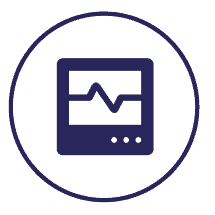PIONEER is the most complete record of the acute health care journey available for research and innovation.
Our data is routinely collected from the electronic health record systems of participating healthcare providers and is updated at least monthly. It includes presenting symptoms and patient demographics including (but not limited to) age, ethnicity and multimorbidity.
All serial readings of physiology – such as pulse, blood pressure and oxygen saturation – are included within PIONEER’s database, as well as acuity scores, laboratory results, imaging and pathology samples.
This data is complemented by diagnoses, prescriptions, drug administrations and interventions. The acute event is placed in context, as PIONEER also includes all previous and subsequent healthcare contacts. Furthermore, PIONEER includes data from people who have not had to rely on acute care services, to enable research focused on reducing the reliance on acute care pathways.
What data do we have?

Attendance Reason

Complications/Diagnosis

Final Outcome

Imaging Reports

Laboratory Tests

Medications/Allergies

Operations/Procedures

Outpatient Care

Patient Transfers

Severity

Synthetic Data

Vital Signs
Specialist datasets available
Tailored to meet specific project needs, PIONEER’s datasets are customised and expanded to meet your unique requirements. Covering a broad spectrum of conditions, pathways, and therapy areas, these datasets are designed to facilitate cutting-edge research which will support informed decision-making in acute care.
A selection of our specialist datasets is shown below, but please contact us for more information.

Unplanned General Medical Attendances and Patient Flow Data
This PIONEER-curated dataset comprises 1,335,540 Acute Medical Emergency Department admissions recorded between 2020 and 2024. The data is structured to...

NIHR PSRC AMU Dataset for Medical Same Day Emergency Care Patients and Pathways
Medical Same Day Emergency Care (SMDEC) services review almost half of all unplanned attendances requiring medical review. Activity has risen...

A HDRUK Medicines Dataset: Antibiotic Allergies and Prescribing on ICU
Approximately 10% of the population have a self-reported allergy label. The symptoms causing patients to label themselves as being allergic...

Safe Data
We assess the risk that a person could be identified from the data and minimise this so that privacy is protected.

Safe Projects
We ensure the requested use of the data is appropriate, that it won’t discriminate against any groups of citizens and that the knowledge gained from the data will lead to public good.

Safe People
We review who the data requestors are, and undertake a due diligence assessment, to check that the researchers can be trusted to use the data appropriately.

Safe Settings
We build Trusted Research Environments for data analysis. These secure environments have been cybersecurity tested and meet specific international ISO standards, meaning we control who accesses the data and what they do with it.

Safe Outputs
We examine all outputs from data analysis and ensure that the results can not cause any individual to be identified.



